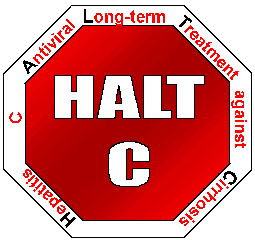Low-dose
Pegylated Interferon Maintenance Therapy Does Not
Reduce Clinical Outcomes despite Persistent HCV Suppression
 |
 |
 |
 |
 |
 |
 |
| SUMMARY:
Low-dose pegylated interferon maintenance
therapy did not reduce the rate of adverse
clinical outcomes of chronic hepatitis C
virus (HCV) infection among patients who
did not respond to standard-of-care combination
therapy, even if their viral load remained
suppressed. These findings from the HALT-C
trial were published in the December
2009 issue of Gastroenterology.
|
|
 |
 |
 |
 |
 |
 |
 |
By
Liz Highleyman
 In
the HALT-C trial, more than 1000 participants with
advanced liver disease who did not achieve sustained
virological response (SVR) to standard treatment
with pegylated
interferon alfa-2a (Pegasys) or pegylated interferon
alfa-2b (PegIntron) plus ribavirin were randomly
assigned to received either low-dose (90 mcg/week)
pegylated interferon alfa-2a maintenance therapy or
no further treatment.
In
the HALT-C trial, more than 1000 participants with
advanced liver disease who did not achieve sustained
virological response (SVR) to standard treatment
with pegylated
interferon alfa-2a (Pegasys) or pegylated interferon
alfa-2b (PegIntron) plus ribavirin were randomly
assigned to received either low-dose (90 mcg/week)
pegylated interferon alfa-2a maintenance therapy or
no further treatment.
As
previously reported, after 3.5 years, patients
who received maintenance therapy had lower liver enzyme
(ALT and AST) and HCV RNA levels, but were not significantly
less likely to progress to hepatocellular carcinoma,
decompensated cirrhosis (e.g., ascites, variceal hemorrhage,
hepatic encephalopathy), fibrosis score increase of
2 or more points, or death.
In
the present study, the HALT-C team explored whether
persistent HCV RNA suppression during the trial was
associated with reduced clinical outcomes. This analysis
included 764 patients treated during the lead-in (standard
combination therapy) phase of HALT-C and randomized
to the maintenance therapy or no further treatment
(control) arms.
Results
 |
During
the lead-in combination therapy phase, 178 patients
(23%) experienced at least a 4 log10 decline in
serum HCV RNA. |
 |
82%
of these patients achieved undetectable HCV RNA,
but later experienced viral breakthrough or relapse.
|
 |
This
group had significantly fewer clinical outcomes,
whether they were randomized to receive maintenance
therapy or no further treatment (P = 0.003). |
 |
Following
randomization, HCV RNA levels increased significantly
in all 90 patients (100%) in the control arm and
in 58 of the 88 patients (66%) receiving maintenance
therapy. |
 |
Only
30 patients overall had HCV RNA persistently suppressed
by 4 log10 or more during the course of the study.
|
 |
Among
these patients, there was no significant reduction
in clinical outcomes versus participants with
rising viral load. |
Based
on these findings, the investigators concluded, "Viral
suppression by >4 log10 with full dose peginterferon/ribavirin
is associated with a significant reduction in clinical
outcomes."
However,
they added, "Continuing low dose peginterferon
maintenance therapy, even in patients with persistent
viral suppression, does not lead to a further decline
in clinical outcomes."
Virginia Commonwealth University Medical Center,
Richmond, VA; University of Washington, Seattle, WA;
Massachusetts General Hospital and Harvard Medical
School, Boston, MA; Keck School of Medicine, University
of Southern California, Los Angeles, CA; University
of California-Irvine, Irvine, CA; University of Texas
Southwestern Medical Center, Dallas, TX; National
Institute of Diabetes and Digestive and Kidney Diseases,
National Institutes of Health, Bethesda, MD; New England
Research Institutes, Watertown, MA: University of
Colorado Denver, Anschutz Medical Campus, Aurora,
CO; University of Michigan Medical Center, Ann Arbor,
MI; St. Louis University School of Medicine, St. Louis,
MO; University of Connecticut Health Center, Farmington,
CT.
1/05/10
Reference
M
Shiffman, C Morishima, JL Dienstag, and others (HALT-C
Trial Group). Effect of HCV RNA Suppression During
Peginterferon Alfa-2a Maintenance Therapy on Clinical
Outcomes in the HALT-C Trial. Gastroenterology
137(6): 1986-1994 (Abstract).
December 2009.